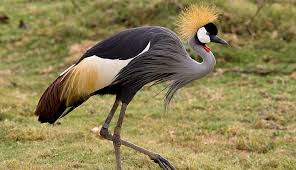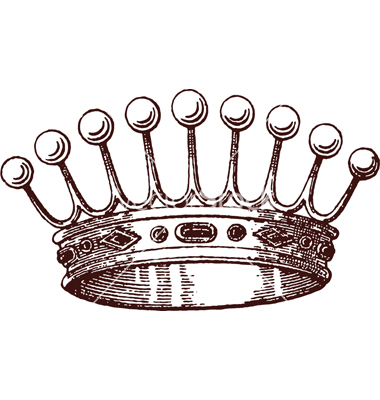Stamp: Grey Crowned Crane (Balearica regulorum) (Uganda 1935)
Grey Crowned Crane (Balearica regulorum) (Uganda 1935)
01 January (Uganda ) within release Revenue goes into circulation Stamp Grey Crowned Crane (Balearica regulorum) face value 10 East African shilling
Stamp is vertical format.
Kenya, Uganda, Tanganyika postage stamp overprinted "Uganda Revenue" in black Revenue Reverend cat. no: R137Also in the issue Revenue:
- Stamp - Dhow on Lake Victoria face value 50;
- Stamp - Grey Crowned Crane (Balearica regulorum) face value 20;
- Stamp - Grey Crowned Crane (Balearica regulorum) face value 10;
- Stamp - Lake Naivasha face value 1;
- Stamp - Lion (Panthera leo) face value 10;
- Stamp - Lion (Panthera leo) face value 1;
- Stamp - Mount Kilimanjaro face value 2;
- Stamp - Nile railway bridge (Jinja bridge) Ripon Falls face value 5;
Stamp Grey Crowned Crane (Balearica regulorum) it reflects the thematic directions:
Animals are multicellular, eukaryotic organisms of the kingdom Animalia (also called Metazoa). All animals are motile, meaning they can move spontaneously and independently, at some point in their lives. Their body plan eventually becomes fixed as they develop, although some undergo a process of metamorphosis later on in their lives. All animals are heterotrophs: they must ingest other organisms or their products for sustenance.
Birds (Aves), a subgroup of Reptiles, are the last living examples of Dinosaurs. They are a group of endothermic vertebrates, characterised by feathers, toothless beaked jaws, the laying of hard-shelled eggs, a high metabolic rate, a four-chambered heart, and a strong yet lightweight skeleton. Birds live worldwide and range in size from the 5 cm (2 in) bee hummingbird to the 2.75 m (9 ft) ostrich. They rank as the class of tetrapods with the most living species, at approximately ten thousand, with more than half of these being passerines, sometimes known as perching birds. Birds are the closest living relatives of crocodilians.
Cranes are a type of large bird with long legs and necks in the biological family Gruidae of the order Gruiformes. The family has 15 species placed in four genera which are Antigone, Balearica, Leucogeranus, and Grus. They are large birds with long necks and legs, a tapering form, and long secondary feathers on the wing that project over the tail. Most species have muted gray or white plumages, marked with black, and red bare patches on the face, but the crowned cranes of the genus Balearica have vibrantly-coloured wings and golden "crowns" of feathers. Cranes fly with their necks extended outwards instead of bent into an S-shape and their long legs outstretched.
Famous People refers to the fame and public attention accorded by the mass media to individuals or groups or, occasionally, animals, but is usually applied to the persons or groups of people (celebrity couples, families, etc.) themselves who receive such a status of fame and attention. Celebrity status is often associated with wealth (commonly referred to as fame and fortune), while fame often provides opportunities to make money.
A head of state (or chief of state) is the public persona that officially represents the national unity and legitimacy of a sovereign state. In some countries, the head of state is a ceremonial figurehead with limited or no executive power, while in others, the head of state is also the head of government. In countries with parliamentary governments, the head of state is typically a ceremonial figurehead that does not actually guide day-to-day government activities and may not be empowered to exercise any kind of secular political authority (e.g., Queen Elizabeth II as Head of the Commonwealth). In countries where the head of state is also the head of government, the president serves as both a public figurehead and the actual highest ranking political leader who oversees the executive branch (e.g., the President of the United States).
King is the title given to a male monarch in a variety of contexts. The female equivalent is queen regnant (while the title of queen on its own usually refers to the consort of a king). In the context of prehistory, antiquity and contemporary indigenous peoples, the title may refer to tribal kingship. Germanic kingship is cognate with Indo-European traditions of tribal rulership (c.f. Indic rājan, Gothic reiks, and Old Irish rí, etc.) In the context of classical antiquity, king may translate Latin rex or either Greek archon or basileus. In classical European feudalism, the title of king as the ruler of a kingdom is understood as the highest rank in the feudal order, potentially subject, at least nominally, only to an emperor (harking back to the client kings of the Roman Empire). In a modern context, the title may refer to the ruler of one of a number of modern monarchies (either absolute or constitutional). The title of king is used alongside other titles for monarchs, in the West prince, emperor, archduke, duke or grand duke, in the Middle East sultan or emir; etc. Kings, like other royalty, tend to wear purple because purple was an expensive color to wear in the past.
A man is an adult male human. Prior to adulthood, a male human is referred to as a boy (a male child or adolescent).
A Royalty is the immediate family of a king or queen regnant, and sometimes his or her extended family. The term imperial family appropriately describes the family of an emperor or empress, and the term papal family describes the family of a pope, while the terms baronial family, comital family, ducal family, grand ducal family, or princely family are more appropriate to describe the relatives of a reigning baron, count, duke, grand duke, or prince. However, in common parlance members of any family which reigns by hereditary right are often referred to as royalty or "royals." It is also customary in some circles to refer to the extended relations of a deposed monarch and his or her descendants as a royal family. A dynasty is sometimes referred to as "the House of ...". As of July 2013, there are 26 active sovereign monarchies in the world who rule or reign over 43 countries in all








